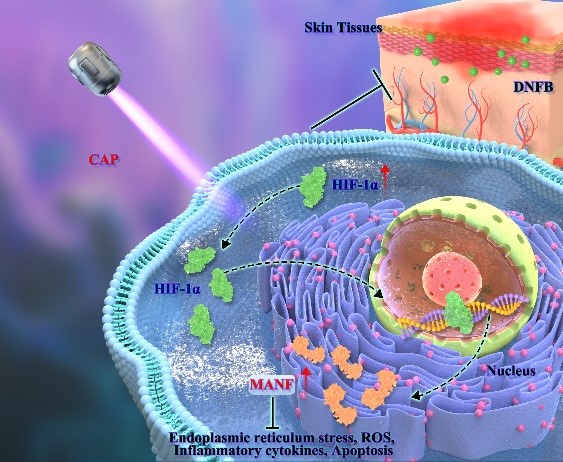
A research group led by Prof. NI Guohua from the Hefei Institutes of Physical Science (HFIPS) of the Chinese Academy of Sciences, collaborating with Prof. WANG Dong from Anhui Medical University, has challenged a new method, cold atmospheric plasma (CAP) to treat atopic dermatitis (AD), a chronic inflammatory skin disease, and was impressed by the effect.
The study, published in Frontiers in Immunology, shows that CAP has promising clinical applications in the treatment of AD.
AD is a chronic inflammatory skin disease with a lifetime prevalence of up to 20%. The clinical manifestations are local skin erythema, papules and severe itching, etc. The main clinical treatment of AD is hormone drugs. Although the effect is good, the side effects are also obvious. Therefore, there is an urgent need to find an effective and safe treatment for AD.
In this study, the researchers used a self-developed plasma device to produce CAP and treated AD mice with CAP.
The results showed that CAP could inhibit the dinitrofluorobenzene-induced skin inflammation. Skin erythema and papules were significantly reduced, abnormal superficial skin thickening was improved, and inflammatory factors were restored.
According to the researchers, CAP promoted the expression of hypoxia-inducible factor-1 (HIF-1), and HIF-1 interacted with the promoter region of the midbrain astrocyte-derived neurotrophic factor (MANF) gene to enhance the transcriptional expression of MANF which has been shown to play a protective role in inflammation by binding to the promoter region of the NF-κB pathway.
They also proved that CAP-induced HIF-1 up-regulation could promote MANF expression to inhibit AD.
This work was supported by the National Natural Science Foundation of China and the National Key R&D Program.

Mechanism of CAP in the treatment of AD. (Image by SUN Tao)

86-10-68597521 (day)
86-10-68597289 (night)

52 Sanlihe Rd., Xicheng District,
Beijing, China (100864)

